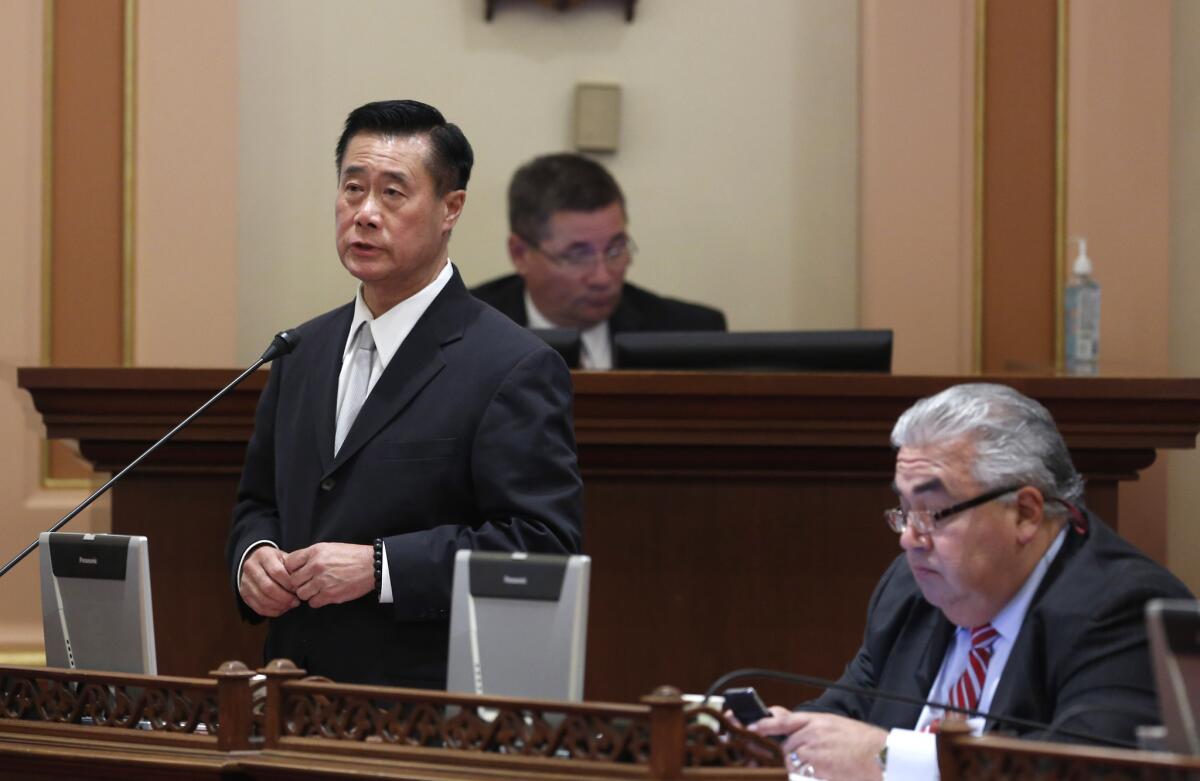New ethics rules proposed for California Senate

- Share via
Reporting from Sacramento — Amid concerns that proposed tougher ethics restrictions may not have enough support to become law this year, leaders of the state Senate are proposing that many of them be adopted as house rules in the interim.
Proposed state Senate resolutions would appoint a Senate ombudsman to hear and investigate complaints of misconduct and provide whistleblower protections to Senate staffers who report wrongdoing.
Another proposed resolution would ban fundraising by senators during the last four weeks of the session from lobbyist employers, lobbyist employees, lobbyist affiliates and political action committees.
“The current political climate has opened windows to reflect and drive cultural changes that would never have been possible a decade ago,” said Senate President Pro Tem Darrell Steinberg (D-Sacramento) in announcing the proposals. “This is an opportunity to reiterate why we choose to run for office, to serve the public, and to reaffirm our commitment to political reform.”
A trio of Republican Senators called the proposals “window dressing” and said they would introduce legislation to double prison sentences, to up to eight years, for any elected official convicted of bribery or selling votes.
“While we appreciate some of the efforts of our friends across the aisle, we’re concerned they are only bringing forward window dressing solutions and Californians will see right through them,” said Sen. Mike Morrell (R-Rancho Cucamonga). “We need to hold ourselves to higher standards, such as increasing the criminal penalties for egregious acts like bribery and show that we have zero tolerance for these situations.”
Asked about the blackout on fundraising proposed by Steinberg, Senate Republican leader Bob Huff said: “The intentions are good, but it’s unworkable. If he truly wants to achieve this objective it should apply to all elected officials in the Legislature and in statewide office, as well as political candidates for those offices. That is a reform we can support.”
The proposals were seen by some other officials as a good first step, but others say they do not go far enough. Some of the proposals are already being debated as legislation.
Sen. Alex Padilla (D-Pacoima) has a bill that would ban all fundraising by legislators for 100 days before the end of each session and seven days afterward. He welcomed the resolution as an interim measure, but said he will still press for approval of his more expansive bill.
“I certainly hope it [the resolution] is not done in lieu of my legislation because I think putting it into statute carries the weight of law that a resolution doesn’t,” Padilla said. “In addition, the way I have written the bill it applies to the entire Legislature, not just the Senate.”
Because Padilla’s bill also applies to the Assembly, some Senate officials are concerned it may not get the votes needed in that house and worry the governor might veto it if it reaches his desk. There is consternation that significant ethics bills may fail, leaving the Senate with little response to scandals that have plagued that house in recent months.
The ethics rules are in response to the March suspensions of Democratic Sens. Ronald S. Calderon of Montebello, Leland Yee of San Francisco and Roderick Wright of the Inglewood area after the trio were hit with separate criminal charges.
Wright is awaiting sentencing after a jury found him guilty of eight felonies including perjury and voter fraud for lying about living in his Senate district. Calderon and Yee have been indicted by federal authorities on corruption charges that include accepting payments for favors.
More to Read
Sign up for Essential California
The most important California stories and recommendations in your inbox every morning.
You may occasionally receive promotional content from the Los Angeles Times.











